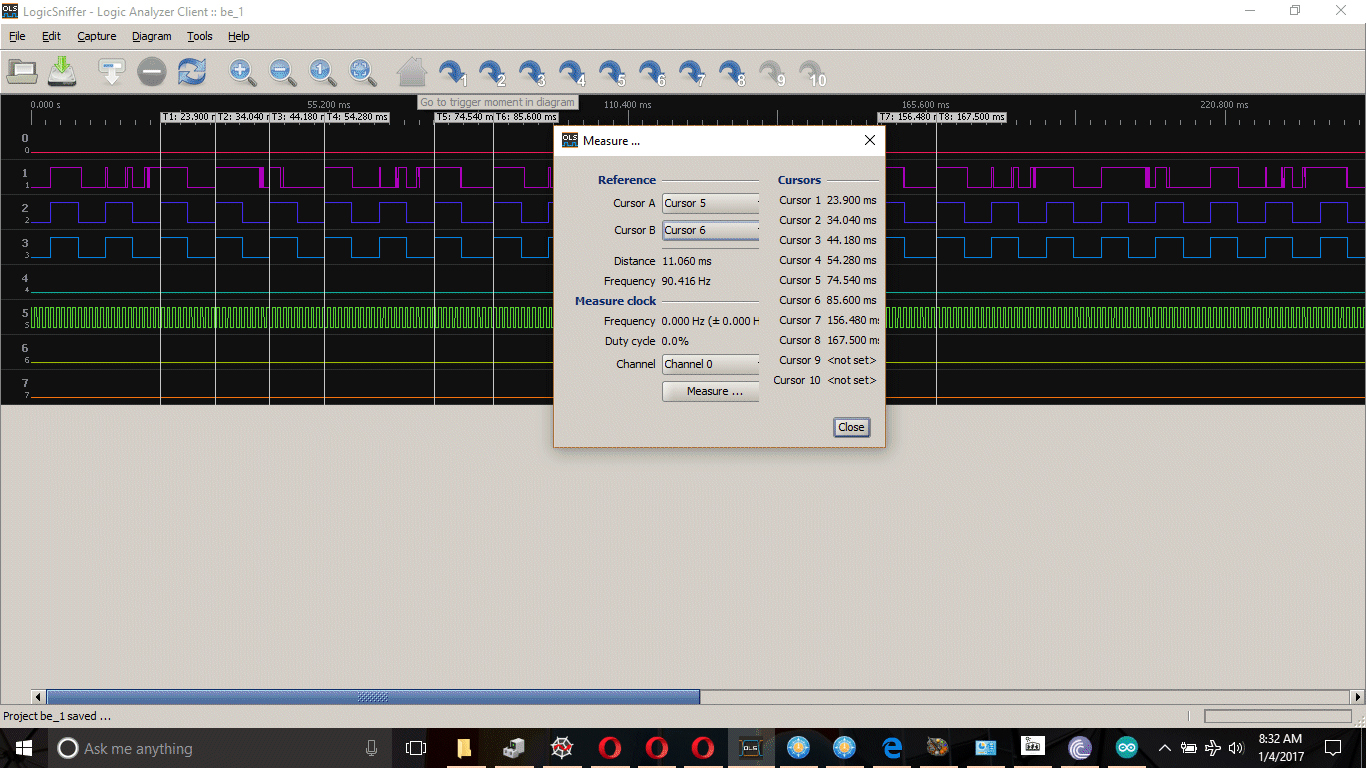Difference between revisions of "Blinking Blues Quick Version"
Russ hensel (talk | contribs) (Created page with "In reply to James C4S and others I have compiled his code to run on pin6 my analyzer channel 3. The code in its entirety is: <pre> const int ledPin=6; void setup() { pi...") |
Russ hensel (talk | contribs) |
||
| (One intermediate revision by the same user not shown) | |||
| Line 1: | Line 1: | ||
| − | + | = Blink Broken = | |
| + | |||
| + | The blink program ( lightly modified ) gives unexpected results. | ||
| + | |||
| + | |||
| + | Reduced version of issues raised at | ||
| + | * [[Blinking Blues]] | ||
| + | * Arduino Forum http://forum.arduino.cc/index.php?topic=445889.0 | ||
| + | |||
| + | |||
| + | == The Analyzer Did It == | ||
| + | |||
| + | Right now it looks like the problem is the dangerous prototype logic sniffer. I will be editing all of this later and contact the dangerous prototype folks. | ||
| + | Go back and look at [[Blinking Blues]] | ||
| + | |||
| + | = The Code = | ||
| + | |||
| + | The code in its entirety is: | ||
<pre> | <pre> | ||
| Line 20: | Line 37: | ||
</pre> | </pre> | ||
| + | = Results = | ||
| + | In the gif below focus on channel 3, that is pin6 The cursor measurement for 1,2,3,4 are all about 10.1 ms, a value which seems "right". But at cursor 5,6 you can see a pulse of period 11.060 ms. This is the "glitch" ( bad term here ) that I am talking about. It repeats about every 80 ms. This sort of behavior with some different details has been present in every test I have conducted. | ||
| − | + | I did look at the rise and fall time on my scope, it is about 20 ns. I cannot catch this stretched pulse on my scope, but looking for a 1 ms discrepancy across 80 ns is not really easy on a scope. I did use the single sweep option and mess with a bunch of the variables. Right now I trust the logic analyzer for this more than the scope, you can try to present an argument for why I should not. I have to confess I have not tried my old 100 mhz analog scope on this guy. | |
| − | + | ||
| + | [[File:BE_1.gif]] | ||
Latest revision as of 11:30, 4 January 2017
Blink Broken[edit]
The blink program ( lightly modified ) gives unexpected results.
Reduced version of issues raised at
The Analyzer Did It[edit]
Right now it looks like the problem is the dangerous prototype logic sniffer. I will be editing all of this later and contact the dangerous prototype folks. Go back and look at Blinking Blues
The Code[edit]
The code in its entirety is:
const int ledPin=6;
void setup() {
pinMode(ledPin, OUTPUT);
}
void loop() {
while ( true ) {
digitalWrite( ledPin, HIGH ); // turn the LED on
delayMicroseconds( 5000 ); // wait
digitalWrite( ledPin, LOW ); // turn the LED off
delayMicroseconds( 5000 ); // wait
}
}
Results[edit]
In the gif below focus on channel 3, that is pin6 The cursor measurement for 1,2,3,4 are all about 10.1 ms, a value which seems "right". But at cursor 5,6 you can see a pulse of period 11.060 ms. This is the "glitch" ( bad term here ) that I am talking about. It repeats about every 80 ms. This sort of behavior with some different details has been present in every test I have conducted.
I did look at the rise and fall time on my scope, it is about 20 ns. I cannot catch this stretched pulse on my scope, but looking for a 1 ms discrepancy across 80 ns is not really easy on a scope. I did use the single sweep option and mess with a bunch of the variables. Right now I trust the logic analyzer for this more than the scope, you can try to present an argument for why I should not. I have to confess I have not tried my old 100 mhz analog scope on this guy.
